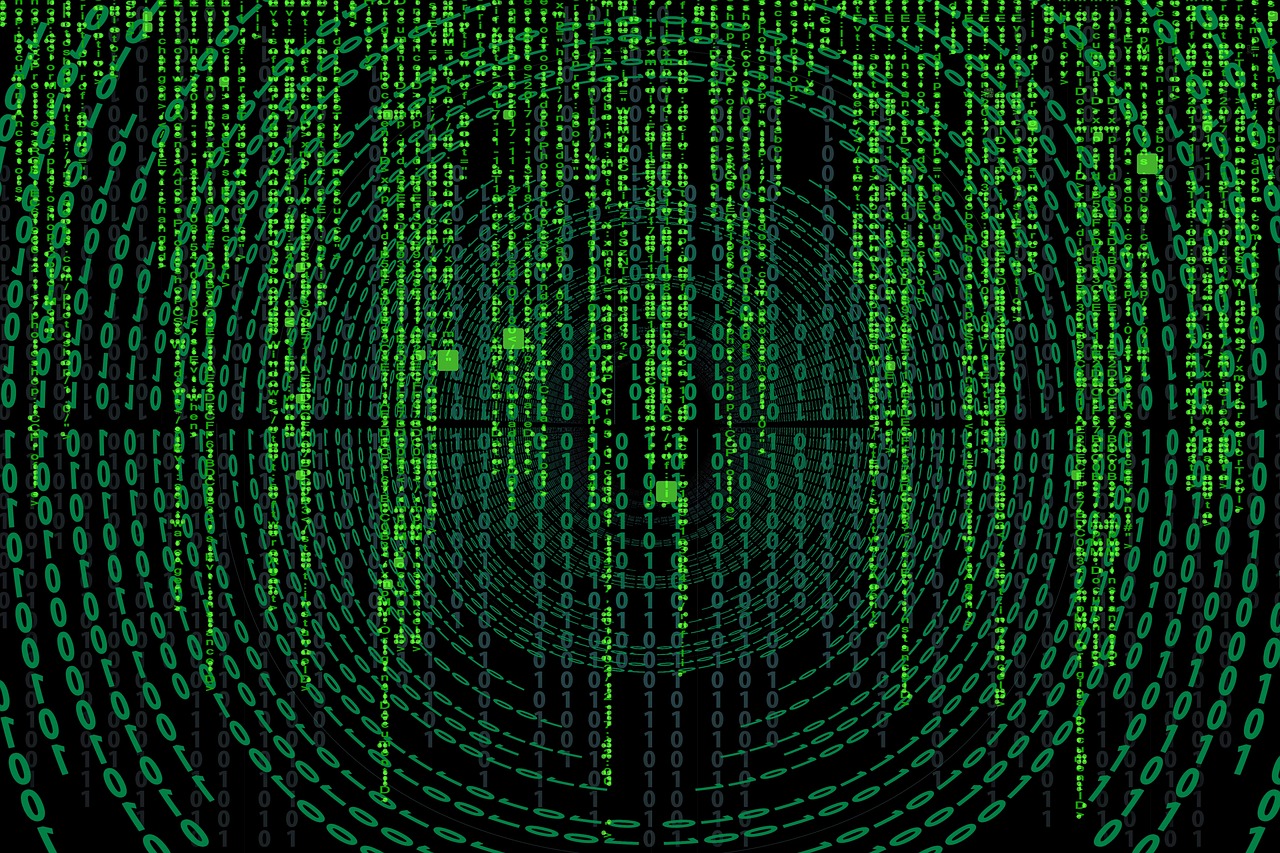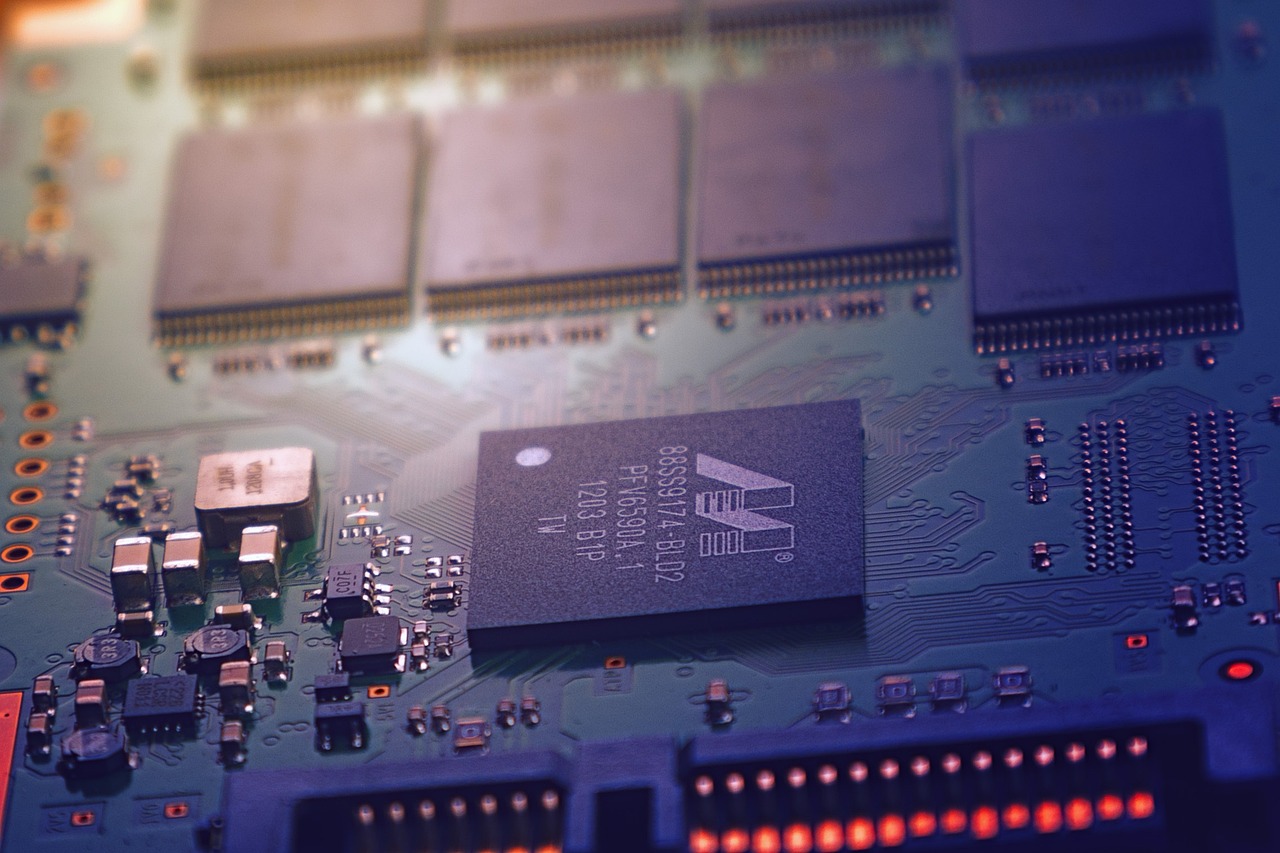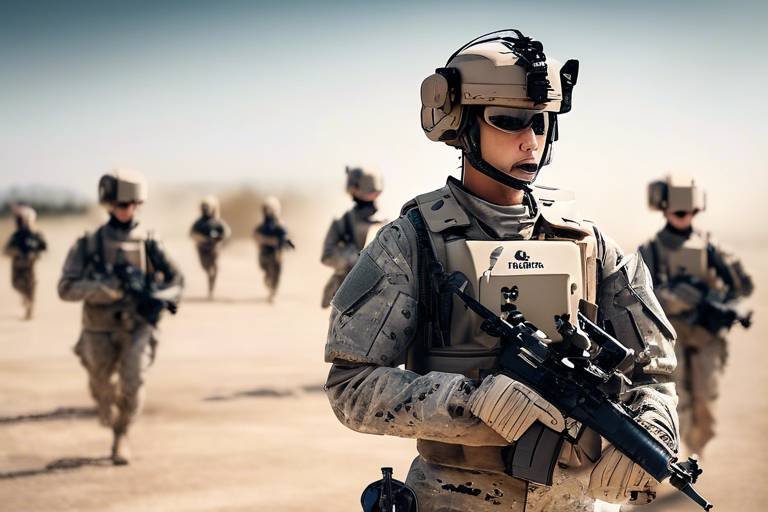The Importance of Data Privacy in Military Operations
In today's world, where information flows faster than a speeding bullet, data privacy has emerged as a cornerstone of military operations. Imagine a battlefield where every move is monitored, and every communication is vulnerable to interception. The stakes are incredibly high, and the implications of data breaches can be catastrophic. That's why understanding and implementing data privacy measures is not just a technical necessity; it's a matter of national security. In an age where cyber threats loom large, the military must prioritize the protection of sensitive information to maintain operational effectiveness and safeguard the lives of personnel.
Data privacy in military contexts goes beyond just protecting classified documents. It encompasses a wide range of information, including personal data of service members, operational plans, and intelligence reports. When this information falls into the wrong hands, it can lead to dire consequences, such as compromised missions, endangered lives, and even international conflicts. Therefore, it is essential to establish robust frameworks that govern how data is collected, stored, and shared.
As we delve deeper into the intricacies of data privacy, it becomes clear that the military faces a multitude of threats. From cyber attacks orchestrated by hostile nations to insider threats from within its ranks, the challenges are numerous. Each of these threats can chip away at the integrity of military operations, making it imperative to adopt comprehensive strategies that not only protect data but also foster a culture of security awareness among personnel.
But what does it mean to have a culture of security? It means that every individual, from the highest-ranking officer to the newest recruit, understands their role in safeguarding sensitive information. This involves regular training and awareness programs that equip military personnel with the knowledge and skills to recognize potential threats. After all, a chain is only as strong as its weakest link, and in the military, each member plays a critical role in maintaining the integrity of operations.
Furthermore, the legal and ethical dimensions of data privacy cannot be overlooked. Military operations must navigate a complex web of laws and regulations that govern data handling, both domestically and internationally. This means understanding the implications of international data privacy laws and ensuring compliance during cross-border operations. Balancing the need for national security with the rights of individuals and organizations is a tightrope walk that requires careful consideration and transparency.
Looking ahead, the future of data privacy in military operations is poised for transformation. As technology continues to evolve, so too will the tactics employed by adversaries. This necessitates a proactive approach, where military organizations not only adapt to current threats but also anticipate future challenges. Innovative solutions, such as advanced encryption techniques and artificial intelligence-driven security protocols, will play a crucial role in safeguarding sensitive information.
In conclusion, the importance of data privacy in military operations cannot be overstated. It is a vital component that ensures the safety and effectiveness of military missions. By prioritizing data privacy, the military can protect its personnel, maintain operational integrity, and uphold the trust of the public. As we navigate this digital age, let us remember that the battle for data privacy is not just a technical challenge; it's a mission-critical endeavor that demands our utmost attention and commitment.
- Why is data privacy crucial in military operations? Data privacy is essential to protect sensitive information that, if compromised, could jeopardize national security and operational effectiveness.
- What are the main threats to military data privacy? Major threats include cyber attacks, insider threats, and data leaks.
- How can military personnel contribute to data privacy? By undergoing training and being aware of best practices, personnel can recognize and respond to potential threats effectively.
- What legal considerations affect military data privacy? Military operations must comply with various international regulations and laws governing data handling and privacy.
- What does the future hold for data privacy in military operations? The future will require adaptive strategies and innovative technologies to address emerging threats in an ever-evolving digital landscape.

Understanding Data Privacy
Data privacy is a term that resonates deeply in our increasingly interconnected world, especially within the realm of military operations. It refers to the proper handling of sensitive information, which encompasses everything from personal data of military personnel to classified operational details. In essence, data privacy is about ensuring that this information is collected, stored, and shared securely, thus preventing unauthorized access and potential breaches that could jeopardize national security.
Imagine a fortress where every piece of information is a precious jewel. Just like a fortress needs strong walls and vigilant guards to protect its treasures, data privacy requires robust systems and protocols to safeguard sensitive information. In military contexts, the stakes are even higher. A breach in data privacy can lead to disastrous consequences, including the exposure of operational plans, the identities of personnel, or even the locations of critical assets. Therefore, understanding the nuances of data privacy is not just a technical requirement; it is a vital component of operational security.
Moreover, the digital transformation of military operations has made the landscape of data privacy more complex. With the rise of cloud computing, artificial intelligence, and the Internet of Things (IoT), sensitive data is often stored and transmitted across various platforms and devices. This interconnectedness, while beneficial for operational efficiency, also opens up new avenues for potential threats. As such, military organizations must be proactive in adopting comprehensive data privacy policies that address these challenges.
To illustrate the importance of data privacy, consider the following key elements that define its scope:
- Data Collection: The methods and purposes for which data is gathered must be clearly defined and communicated.
- Data Storage: Secure storage solutions must be implemented to protect data from unauthorized access.
- Data Sharing: Clear protocols should govern how and with whom data is shared, ensuring compliance with legal and ethical standards.
In conclusion, understanding data privacy is crucial for military operations as it not only protects sensitive information but also fosters trust among personnel and stakeholders. As we navigate through the complexities of the digital age, prioritizing data privacy will be key to maintaining operational integrity and national security.
- What is data privacy in military operations? Data privacy in military operations refers to the secure handling of sensitive information to prevent unauthorized access and breaches.
- Why is data privacy important? It is essential for safeguarding national security, protecting personnel information, and maintaining operational effectiveness.
- What are the common threats to data privacy? Common threats include cyber attacks, insider threats, and data leaks.

Threats to Military Data Privacy
The digital age has brought about remarkable advancements, but it has also opened the floodgates to a myriad of threats that can jeopardize military data privacy. In an era where information is the new gold, safeguarding sensitive data has become more critical than ever. Military operations are not just about boots on the ground; they are increasingly reliant on technology and data. This dependence makes them vulnerable to various threats, which can have catastrophic consequences for national security and operational effectiveness.
One of the most significant threats to military data privacy comes from cyber attacks. These attacks can take many forms, from sophisticated hacking attempts to more rudimentary phishing schemes. Cybercriminals and state-sponsored hackers are constantly devising new methods to infiltrate military networks, aiming to steal sensitive information or disrupt operations. The consequences of a successful cyber attack can be devastating, leading to compromised missions and loss of life.
In addition to external threats, insider threats pose a significant risk. These threats originate from within the military itself, often involving personnel who have legitimate access to sensitive data but misuse that access for malicious purposes. Whether it's leaking information to foreign adversaries or inadvertently exposing data through negligence, insider threats can be just as damaging as external attacks. The challenge lies in identifying these risks while maintaining trust within the ranks.
Moreover, the potential for data leaks is ever-present. Whether through careless handling of information, inadequate security protocols, or even hardware failures, sensitive data can easily fall into the wrong hands. For instance, a misplaced laptop containing classified information could lead to a significant breach. The importance of robust data handling practices cannot be overstated, as even the smallest oversight can have far-reaching consequences.
To illustrate the various threats, consider the following table that summarizes the key threats to military data privacy:
| Threat Type | Description | Potential Impact |
|---|---|---|
| Cyber Attacks | External attempts to access military networks and steal or corrupt data. | Compromised missions, loss of classified information. |
| Insider Threats | Personnel misusing their access to sensitive data. | Data leaks, operational sabotage. |
| Data Leaks | Accidental or intentional exposure of sensitive information. | National security risks, loss of public trust. |
As military operations continue to evolve, so too do the threats they face. Staying ahead of these challenges requires a proactive approach to data privacy. By understanding the nature of these threats, military organizations can implement effective strategies to mitigate risks and protect sensitive information. After all, in the world of military operations, the stakes couldn’t be higher.
- What are the main threats to military data privacy?
The main threats include cyber attacks, insider threats, and data leaks, each posing significant risks to national security. - How can military organizations protect against cyber attacks?
Implementing robust cybersecurity measures, including firewalls, intrusion detection systems, and regular security audits, can help protect against cyber threats. - What role does personnel training play in data privacy?
Training military personnel on data privacy best practices fosters a culture of security and helps them recognize potential threats.

Cybersecurity Measures
This article explores the critical role of data privacy in military operations, highlighting its significance in safeguarding sensitive information and ensuring operational security in an increasingly digital world.
Data privacy refers to the proper handling of sensitive information, ensuring that personal and operational data is collected, stored, and shared securely to prevent unauthorized access and breaches.
Military operations face various threats to data privacy, including cyber attacks, insider threats, and data leaks, which can compromise national security and operational effectiveness.
Implementing robust is essential for protecting sensitive military data from external threats. In an era where cyber warfare is as real as traditional combat, the military must adopt advanced technologies and protocols to safeguard the integrity of their information. The stakes are incredibly high; a single breach can lead to catastrophic consequences, not just for military operations but for national security as a whole.
To combat these threats, military organizations are increasingly investing in a multi-layered approach to cybersecurity. This includes not only cutting-edge technology but also comprehensive strategies that encompass human resources, policies, and procedures. Here are some key components of effective cybersecurity measures:
- Firewalls and Intrusion Detection Systems: These tools act as the first line of defense, monitoring incoming and outgoing network traffic to identify suspicious activity.
- Regular Software Updates: Keeping software up-to-date is crucial for patching vulnerabilities that could be exploited by cybercriminals.
- Incident Response Plans: Having a well-defined plan in place allows military units to respond swiftly to data breaches, minimizing damage and restoring operations.
Moreover, the integration of artificial intelligence in cybersecurity practices is becoming increasingly popular. AI can analyze vast amounts of data in real-time, enabling quicker identification of anomalies and potential threats. This technology not only enhances the speed of threat detection but also improves the overall accuracy of security measures.
Encryption techniques are vital for securing data in transit and at rest, ensuring that even if data is intercepted, it remains unreadable to unauthorized users. By converting sensitive information into a coded format, encryption serves as a formidable barrier against cyber intrusions. This is especially important in military operations where even a small leak of information can jeopardize missions and personnel safety.
Access control protocols help restrict data access to authorized personnel only, minimizing the risk of insider threats and ensuring that sensitive information is only available to those who need it. Implementing role-based access control (RBAC) allows military organizations to assign permissions based on the user's role, ensuring that only those with a legitimate need to know can access critical information. This layered approach to access control not only protects data but also fosters a culture of accountability among personnel.
Training military personnel on data privacy best practices is crucial for fostering a culture of security and awareness, empowering them to recognize and respond to potential threats effectively.
Military operations must navigate complex legal and ethical frameworks regarding data privacy, balancing national security needs with the rights of individuals and organizations.
Understanding international regulations surrounding data privacy helps military operations remain compliant while conducting cross-border operations and collaborating with allied forces.
The ethical implications of data privacy in military operations involve considerations of trust, transparency, and accountability, ensuring that operations respect human rights and maintain public confidence.
As technology evolves, the future of data privacy in military operations will require adaptive strategies and innovative solutions to address emerging threats and challenges in the digital landscape.
- What is data privacy in military operations?
Data privacy in military operations refers to the protection of sensitive information to prevent unauthorized access and breaches, ensuring national security.
- What are the main threats to military data privacy?
The main threats include cyber attacks, insider threats, and data leaks, all of which can have severe consequences for operational effectiveness.
- How can military organizations enhance cybersecurity?
By implementing robust measures like firewalls, intrusion detection systems, regular software updates, and AI-driven analytics.
- Why is training important for military personnel?
Training fosters a culture of security awareness, enabling personnel to recognize and respond to potential data privacy threats effectively.

Encryption Techniques
In the realm of military operations, serve as a formidable shield against unauthorized access. Imagine sending a secret message in a language that only you and your closest allies understand; that's precisely what encryption does for sensitive military data. By transforming readable information into a coded format, encryption ensures that even if data is intercepted, it remains indecipherable to prying eyes. This is particularly crucial in an era where cyber threats lurk around every digital corner, waiting for an opportunity to exploit vulnerabilities.
There are several encryption methods utilized by military organizations, each designed to meet specific security needs. For instance, symmetric encryption uses the same key for both encryption and decryption, making it efficient for large volumes of data. Conversely, asymmetric encryption employs a pair of keys—one public and one private—adding an extra layer of security, especially for communication between different parties. The choice of encryption technique often depends on the context of the operation and the sensitivity of the information being protected.
Moreover, the implementation of encryption is not just about the technology itself but also involves protocols and best practices to ensure its effectiveness. For example, regularly updating encryption keys is crucial to maintaining security integrity. If keys are compromised, the entire system could be at risk. Additionally, using strong algorithms is essential; outdated or weak encryption methods can easily fall prey to sophisticated cyber attacks. Here’s a brief overview of some widely used encryption standards in military applications:
| Encryption Type | Description | Use Case |
|---|---|---|
| Symmetric Encryption | Uses a single key for both encryption and decryption | Large data transfers |
| Asymmetric Encryption | Utilizes a pair of keys (public and private) | Secure communications |
| Hash Functions | Transforms data into a fixed-size string of characters | Data integrity verification |
Furthermore, it’s essential to consider the evolving landscape of encryption technologies. With advancements in quantum computing, traditional encryption methods face new challenges. Military operations must stay ahead of these developments, adopting quantum-resistant algorithms to safeguard their data against future threats. The ongoing research and implementation of such technologies highlight the dynamic nature of data security in military contexts.
In summary, encryption techniques are not merely technical measures; they are vital components of a broader strategy to protect sensitive military information. As we navigate an increasingly digital battlefield, the importance of robust encryption cannot be overstated. It acts as a gatekeeper, ensuring that only authorized personnel can access critical data, thus maintaining operational security and national defense.
- What is encryption? Encryption is the process of converting information into a coded format to prevent unauthorized access.
- Why is encryption important in military operations? It protects sensitive data from cyber threats and ensures that only authorized personnel can access critical information.
- What are the main types of encryption used in the military? The main types include symmetric encryption, asymmetric encryption, and hash functions.
- How does quantum computing affect encryption? Quantum computing poses potential threats to traditional encryption methods, necessitating the development of quantum-resistant algorithms.

Access Control Protocols
This article explores the critical role of data privacy in military operations, highlighting its significance in safeguarding sensitive information and ensuring operational security in an increasingly digital world.
Data privacy refers to the proper handling of sensitive information, ensuring that personal and operational data is collected, stored, and shared securely to prevent unauthorized access and breaches.
Military operations face various threats to data privacy, including cyber attacks, insider threats, and data leaks, which can compromise national security and operational effectiveness.
Implementing robust cybersecurity measures is essential for protecting sensitive military data from external threats, involving advanced technologies and protocols to safeguard information integrity.
Encryption techniques are vital for securing data in transit and at rest, ensuring that even if data is intercepted, it remains unreadable to unauthorized users.
Access control protocols serve as the gatekeepers of sensitive military information, ensuring that only authorized personnel can access specific data. Think of them as a bouncer at a club; they check IDs and only let in those who are supposed to be there. In the military context, this means implementing strict guidelines and technologies that determine who can view, modify, or share sensitive information.
One of the most effective ways to enforce access control is through the principle of least privilege. This principle dictates that individuals should only have access to the information necessary for their roles. For instance, a logistics officer may need access to supply chain data but should not have clearance for operational plans. By minimizing access, the risk of insider threats is significantly reduced.
Access control can be categorized into several types:
- Mandatory Access Control (MAC): Under this model, access rights are regulated by a central authority based on multiple security levels. It’s often used in government and military settings where security is paramount.
- Discretionary Access Control (DAC): This allows owners of the data to control who has access to their information. While it offers flexibility, it can also lead to security lapses if not managed properly.
- Role-Based Access Control (RBAC): This system grants access based on the user’s role within the organization. It streamlines the management of permissions and ensures that personnel only access what they need.
Moreover, regular audits and reviews of access control protocols are essential. By frequently assessing who has access to what, military operations can identify and rectify any unauthorized access that may have slipped through the cracks. This proactive approach not only enhances security but also helps in maintaining accountability.
Training military personnel on data privacy best practices is crucial for fostering a culture of security and awareness, empowering them to recognize and respond to potential threats effectively.
Military operations must navigate complex legal and ethical frameworks regarding data privacy, balancing national security needs with the rights of individuals and organizations.
Understanding international regulations surrounding data privacy helps military operations remain compliant while conducting cross-border operations and collaborating with allied forces.
The ethical implications of data privacy in military operations involve considerations of trust, transparency, and accountability, ensuring that operations respect human rights and maintain public confidence.
As technology evolves, the future of data privacy in military operations will require adaptive strategies and innovative solutions to address emerging threats and challenges in the digital landscape.
- What are access control protocols?
Access control protocols are security measures that restrict access to sensitive information, ensuring only authorized personnel can view or modify data. - Why is data privacy important in military operations?
Data privacy is crucial in military operations to protect sensitive information from breaches that could compromise national security and operational effectiveness. - What is the principle of least privilege?
The principle of least privilege is a security concept that suggests individuals should only have access to the information necessary for their specific roles, minimizing security risks. - How can military personnel be trained on data privacy?
Training can include workshops, simulations, and regular updates on best practices to ensure personnel are aware of potential threats and how to mitigate them.

Training and Awareness
In the realm of military operations, are not just buzzwords; they are the backbone of a secure environment. Imagine a soldier equipped with the latest technology but lacking the knowledge to use it effectively. It’s like giving a child a shiny new toy without teaching them how to play with it safely. This is why it’s crucial to cultivate a culture of security among military personnel.
Training programs should be designed to cover the full spectrum of data privacy best practices. This includes understanding the importance of safeguarding sensitive information, recognizing potential threats, and knowing how to respond appropriately. Regular workshops and simulations can be instrumental in this regard. By immersing personnel in realistic scenarios, they can learn to identify suspicious activities and take immediate action, thereby minimizing risks.
Moreover, awareness campaigns can help in creating an environment where data privacy is prioritized. These campaigns can include posters, newsletters, and digital content that remind personnel of their responsibilities regarding data handling. When everyone is on the same page, the chances of data breaches diminish significantly.
To illustrate the impact of effective training, consider the following table that outlines the key components of a successful data privacy training program:
| Training Component | Description | Frequency |
|---|---|---|
| Initial Training | Basic principles of data privacy, including laws and regulations. | Upon onboarding |
| Refresher Courses | Updates on new threats and technologies. | Annually |
| Simulation Exercises | Real-life scenarios to practice response strategies. | Quarterly |
| Awareness Campaigns | Ongoing reminders and updates on best practices. | Monthly |
Ultimately, the goal of these training initiatives is to empower military personnel. When they are well-informed, they become the first line of defense against potential threats. Just as a well-trained soldier is crucial on the battlefield, a well-trained individual in data privacy can make all the difference in protecting sensitive information.
In conclusion, investing in training and awareness is not merely a checkbox on a to-do list; it is a vital strategy for enhancing operational security. By fostering a culture of vigilance and responsibility, military forces can ensure that data privacy remains a top priority, safeguarding both personnel and national security.
- Why is data privacy important in military operations?
Data privacy is crucial as it protects sensitive information that could compromise national security if leaked or accessed by unauthorized individuals. - What are common threats to military data privacy?
Common threats include cyber attacks, insider threats, and data leaks, all of which can severely impact operational effectiveness. - How can military personnel stay updated on data privacy practices?
Regular training sessions, refresher courses, and awareness campaigns are essential for keeping personnel informed about the latest data privacy practices and threats. - What role does technology play in data privacy?
Technology, such as encryption and access control protocols, is vital for securing sensitive data and protecting it from unauthorized access.

Legal and Ethical Considerations
In the realm of military operations, surrounding data privacy are paramount. Military organizations must tread carefully through a maze of laws and ethical standards that govern the handling of sensitive information. This balancing act is crucial, as it involves the need to safeguard national security while respecting the rights of individuals and organizations. The stakes are incredibly high; a misstep can lead to significant breaches of trust and potentially jeopardize not just military missions but also the very fabric of democratic societies.
One of the primary legal frameworks that military operations must adhere to is the General Data Protection Regulation (GDPR) in Europe, which sets stringent guidelines for data privacy and protection. Compliance with such regulations is not merely a legal obligation but a necessity for maintaining international relations and operational integrity. For instance, when collaborating with allied forces or conducting cross-border operations, understanding these regulations becomes essential to avoid legal pitfalls that could arise from data mishandling.
Moreover, the ethical implications of data privacy in military operations extend beyond mere compliance. They encompass trust, transparency, and accountability. Military personnel must ensure that their operations respect human rights and do not infringe upon the privacy of civilians. This is especially critical in an age where surveillance technologies are advancing rapidly. The public's perception of military operations can be significantly influenced by how well these organizations manage their data privacy practices. If the public believes that their rights are being compromised, it can lead to a loss of trust that is hard to rebuild.
To illustrate the complexities involved, consider the following table that outlines key legal and ethical considerations in military data privacy:
| Aspect | Legal Considerations | Ethical Considerations |
|---|---|---|
| Data Collection | Compliance with GDPR and other regulations | Ensuring informed consent and transparency |
| Data Sharing | Adherence to international laws | Respecting the privacy of individuals |
| Data Retention | Following legal retention periods | Minimizing data retention to what is necessary |
In addition to these frameworks, military organizations must also develop internal policies that reflect their commitment to ethical data handling. This includes training personnel on the importance of data privacy and the implications of their actions. A well-informed team is less likely to make mistakes that could lead to data breaches or violations of privacy rights. The military must cultivate a culture where every member understands their role in protecting sensitive information and the ethical ramifications of failing to do so.
In conclusion, navigating the legal and ethical landscape of data privacy in military operations is a complex but essential endeavor. Striking the right balance between national security and individual rights not only enhances operational effectiveness but also fosters public trust. As military operations continue to evolve in this digital age, ongoing education and adherence to legal frameworks will be critical in upholding the integrity of military actions.
- What are the main legal frameworks governing military data privacy?
The main legal frameworks include the General Data Protection Regulation (GDPR) and various international laws that dictate how data should be handled during military operations. - Why is ethical consideration important in military data privacy?
Ethical considerations are crucial for maintaining public trust, ensuring respect for human rights, and fostering transparency in military operations. - How can military personnel be trained on data privacy?
Training can include workshops, simulations, and regular updates on legal requirements and best practices for data handling.

International Regulations
In today's interconnected world, military operations must navigate a complex web of regarding data privacy. These regulations are designed to protect sensitive information while balancing the needs of national security with the rights of individuals and organizations. As military forces collaborate with allies across borders, understanding these regulations becomes crucial for ensuring compliance and maintaining operational effectiveness.
One of the most significant frameworks governing data privacy is the General Data Protection Regulation (GDPR), which applies to all entities operating within the European Union (EU) and affects how military operations handle personal data. The GDPR emphasizes the importance of data protection by design and by default, mandating that organizations implement appropriate technical and organizational measures to safeguard personal information. This regulation not only impacts military personnel but also affects contractors and partners who handle data on behalf of the military.
Moreover, various international treaties and agreements, such as the Convention on Cybercrime, establish guidelines for cooperation among nations in combating cybercrime and protecting data privacy. These agreements facilitate information sharing and collaboration, but they also impose certain obligations on military operations to ensure that data is handled in accordance with agreed-upon standards. Failure to comply with these regulations can lead to significant legal repercussions and damage to international relations.
Another important aspect of international regulations is the Wassenaar Arrangement, which controls the export of dual-use technologies that can be used for both civilian and military purposes. This arrangement aims to promote transparency and prevent the proliferation of technologies that could pose a threat to global security. Military operations must be aware of these regulations to avoid inadvertently violating export controls that could jeopardize sensitive information.
To effectively navigate these international regulations, military operations should consider establishing dedicated legal teams to monitor compliance and provide guidance on data privacy matters. Additionally, ongoing training and awareness programs for military personnel can help ensure that everyone understands their responsibilities in handling sensitive information in accordance with international standards.
In summary, as military operations engage in cross-border activities, understanding and adhering to international regulations regarding data privacy is essential. By fostering a culture of compliance and awareness, military organizations can better protect sensitive information while maintaining operational effectiveness in an increasingly digital landscape.
- What are the main international regulations affecting military data privacy?
The main regulations include the General Data Protection Regulation (GDPR), the Convention on Cybercrime, and the Wassenaar Arrangement, among others.
- Why is compliance with international regulations important for military operations?
Compliance is critical to protect sensitive information, avoid legal repercussions, and maintain trust with allies and the public.
- How can military organizations ensure compliance with data privacy regulations?
By establishing legal teams, providing ongoing training, and fostering a culture of awareness among personnel regarding data privacy responsibilities.

Ethical Implications
When we delve into the of data privacy in military operations, we uncover a complex web of considerations that go beyond mere compliance with laws and regulations. At the heart of these implications lies the delicate balance between national security and the fundamental rights of individuals. Military organizations must navigate this terrain with a keen awareness of the potential consequences of their actions. Failing to do so can lead to breaches of trust, erosion of public confidence, and significant legal repercussions.
One of the most pressing ethical concerns is the issue of transparency. Military operations often operate under a veil of secrecy for valid reasons, such as protecting sensitive information. However, this secrecy can sometimes conflict with the public's right to know about how their data is being used and protected. When data is collected from civilians, especially in conflict zones, the military must ensure that there is a clear understanding of how this data will be utilized. This involves establishing robust communication channels and providing clear information about data handling practices.
Moreover, accountability plays a critical role in the ethical landscape of data privacy. Military personnel must be held accountable for their actions regarding data management. This includes ensuring that there are strict guidelines and consequences for those who misuse or mishandle sensitive information. The establishment of an accountability framework not only protects individuals' rights but also reinforces the military's commitment to ethical standards.
Additionally, the implications of data privacy extend to the realm of trust. For military operations to be effective, they must maintain the trust of both their personnel and the public. If individuals believe that their data is not being handled responsibly, it can lead to a breakdown in cooperation and support. This trust is particularly crucial in joint operations with allied forces, where data sharing is essential. A lack of trust can hinder collaboration, ultimately affecting operational success.
To further illustrate these points, consider the following table that summarizes key ethical considerations in military data privacy:
| Ethical Consideration | Description |
|---|---|
| Transparency | Clear communication about data usage and protection practices. |
| Accountability | Establishing consequences for misuse of data. |
| Trust | Maintaining confidence among personnel and the public. |
In conclusion, the ethical implications of data privacy in military operations are profound and multifaceted. As technology continues to evolve, military organizations must remain vigilant in their efforts to uphold ethical standards while safeguarding national security. This balancing act is not just a matter of policy; it is a commitment to respecting human rights and maintaining the trust of the communities they serve.
- Why is data privacy important in military operations?
Data privacy is crucial in military operations to protect sensitive information that, if compromised, could jeopardize national security and operational effectiveness. - What are the main threats to military data privacy?
Major threats include cyber attacks, insider threats, and data leaks, all of which can have severe consequences for military operations. - How can military personnel be trained on data privacy?
Training can include workshops, simulations, and ongoing education about best practices in data handling and cybersecurity measures. - What role does accountability play in data privacy?
Accountability ensures that military personnel are responsible for their actions regarding data management, fostering a culture of security and ethical behavior.

The Future of Data Privacy in Military Operations
As we stand on the brink of a technological revolution, the future of data privacy in military operations is more crucial than ever. With the rapid advancement of digital technologies, military organizations must evolve their strategies to protect sensitive information against an increasingly sophisticated landscape of cyber threats. Imagine a world where every byte of data is a potential target; this is the reality we face today. The stakes are high, and the implications of data breaches can be catastrophic, not just for military operations but for national security as a whole.
To navigate this challenging terrain, military entities will need to adopt adaptive strategies that incorporate cutting-edge technologies. For instance, the integration of artificial intelligence (AI) and machine learning can significantly enhance data analysis and threat detection capabilities. These technologies can sift through vast amounts of data, identifying patterns and anomalies that human analysts might overlook. This not only helps in preemptively addressing potential breaches but also in responding to incidents in real-time.
Moreover, the concept of zero-trust architecture is gaining traction in military circles. This model operates on the premise that no one, whether inside or outside the organization, should be trusted by default. Every access request must be verified, and every user must be authenticated. This approach dramatically reduces the risk of insider threats and ensures that sensitive information is only accessible to those who genuinely need it.
Another critical aspect of the future of data privacy is the emphasis on collaboration and information sharing among allied forces. As military operations increasingly involve joint missions and multinational partnerships, establishing common protocols for data privacy becomes essential. This not only enhances operational effectiveness but also fosters trust among partners. However, this collaboration must be underpinned by rigorous legal frameworks and compliance with international data privacy regulations to protect the rights of individuals and organizations involved.
As we look forward, it’s vital to consider the ethical implications of our technological advancements. The military must balance the need for operational efficiency with the rights of individuals. This means that any data collection or surveillance must be conducted transparently and responsibly, with a clear focus on maintaining public confidence. The more transparent military operations are about their data practices, the more trust they will build with the public.
In conclusion, the future of data privacy in military operations is not just about adopting new technologies; it’s about creating a culture of security that permeates every level of the organization. By investing in training, fostering collaboration, and adhering to ethical standards, military forces can ensure that they are prepared to face the challenges of a digital future. The question is not whether we can protect our data, but how well we can adapt to an ever-changing environment. As we move forward, the integration of innovative solutions will be paramount in safeguarding our most sensitive information.
- What is data privacy in military operations? Data privacy in military operations refers to the measures taken to protect sensitive information from unauthorized access and breaches, ensuring operational security.
- Why is data privacy important for national security? Data privacy is crucial for national security as it prevents sensitive information from falling into the wrong hands, which could compromise military effectiveness and strategic operations.
- What technologies are being used to enhance data privacy? Technologies like artificial intelligence, machine learning, and zero-trust architecture are being implemented to enhance data privacy and security in military operations.
- How does collaboration affect data privacy in military operations? Collaboration among allied forces can enhance operational effectiveness but requires strict adherence to data privacy regulations to protect individual rights.
- What are the ethical implications of data privacy in the military? Ethical implications include the need for transparency, accountability, and respect for human rights while conducting military operations.
Frequently Asked Questions
- What is data privacy in military operations?
Data privacy in military operations refers to the secure handling of sensitive information, ensuring that both personal and operational data are collected, stored, and shared in a way that prevents unauthorized access and breaches. It's crucial for maintaining operational security in a digital age where threats are ever-evolving.
- What are the main threats to military data privacy?
Military data privacy faces several threats, including cyber attacks, insider threats, and data leaks. These threats can compromise national security and affect the effectiveness of military operations. Understanding these risks is essential for implementing effective protective measures.
- How can military operations protect sensitive data?
Protecting sensitive data involves a combination of robust cybersecurity measures, such as encryption techniques and access control protocols. Encryption secures data both in transit and at rest, making it unreadable to unauthorized users, while access control ensures that only authorized personnel can access sensitive information.
- Why is training important for military personnel regarding data privacy?
Training military personnel on data privacy best practices is vital for fostering a culture of security. It empowers them to recognize potential threats and respond effectively, reducing the risk of data breaches caused by human error. Awareness is key to maintaining operational integrity.
- What legal considerations must military operations be aware of?
Military operations must navigate complex legal frameworks related to data privacy, balancing the need for national security with the rights of individuals and organizations. Understanding international regulations is essential, especially when conducting cross-border operations and collaborating with allied forces.
- What are the ethical implications of data privacy in military operations?
The ethical implications involve trust, transparency, and accountability. Military operations must ensure that their actions respect human rights and maintain public confidence, which is increasingly important in a world where data privacy concerns are at the forefront of public discourse.
- How is the future of data privacy evolving in military operations?
As technology continues to evolve, the future of data privacy in military operations will require adaptive strategies and innovative solutions. This includes staying ahead of emerging threats and challenges in the digital landscape to ensure that sensitive information remains secure.



















